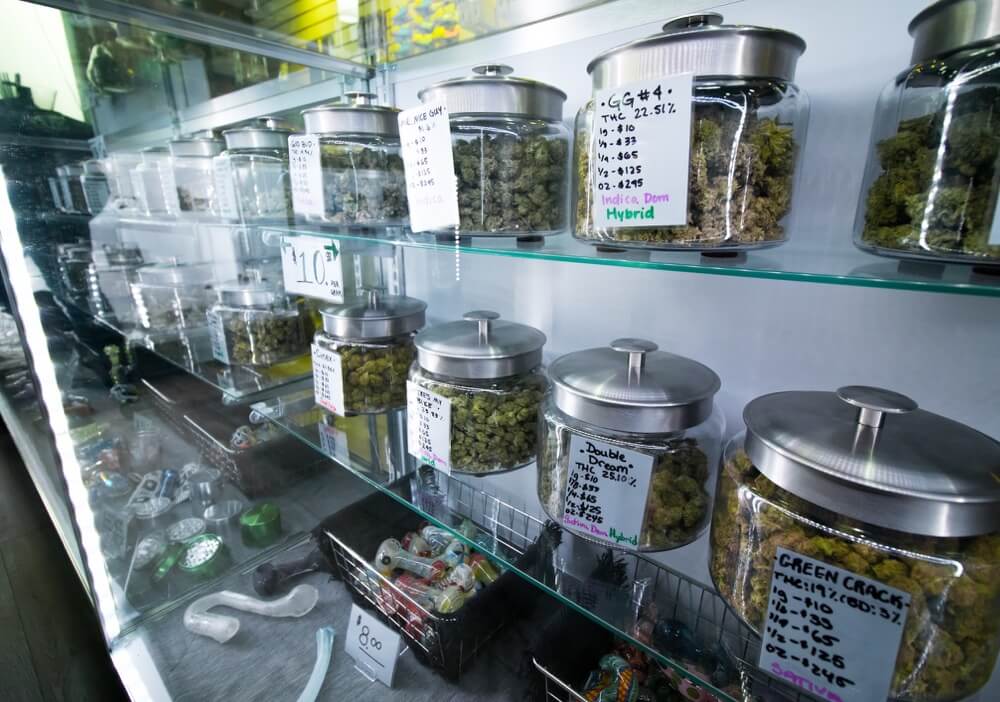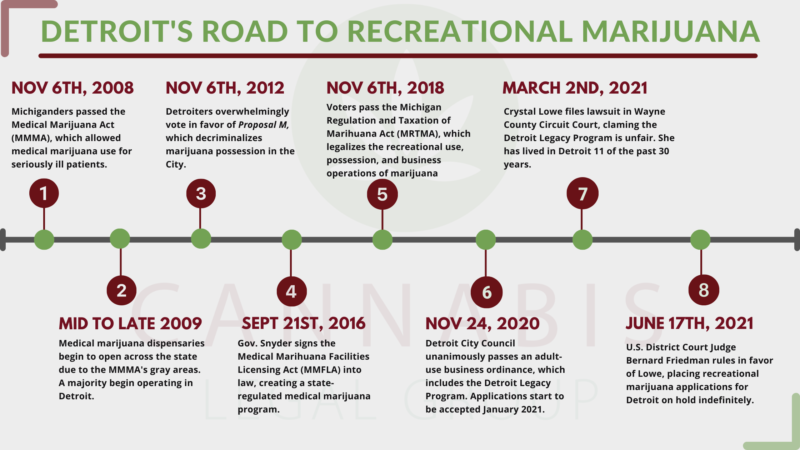Detroit Marijuana Applications on Hold Indefinitely: Why?

The City of Detroit failed to provide Detroiters the opportunity to participate in the recreational marijuana industry. Due to a recent federal court ruling, the City Council is heading back to the drawing board.
How the Detroit Marijuana Ordinance Tried to Help War on Drugs Victims
The cannabis industry desperately needs opportunities available for those who are historically disadvantaged by cannabis prohibition. For the past 50 years, African-Americans are approximately four times more likely to be arrested, prosecuted and convicted for non-violent marijuana related offenses; despite black and white people using marijuana at the same rate.
This disturbing injustice comes with a significant cost to those affected. This includes (but isn’t limited to) a consistent loss of employment opportunities, increased employment discrimination, and racially motivated economic suppression that has flourished for decades. Additionally, there are people who remain incarcerated today for marijuana. If these offenses were committed today, they would be punished by no more than a misdemeanor. It’s extremely unfair for a legal cannabis industry to thrive without including the many victims of its prohibition.
Like many cities all over Michigan, The City of Detroit sought to adopt social equity programs to address this systemic injustice. During Mayor Mike Duggan’s State of the City address back in January 2019, he announced that the City Council would introduce their recreational marijuana facilities ordinance.
The highlight? The ordinance promised longtime residents from the city (“Legacy Applicants”) at least half of the available recreational licenses.
What Went Wrong?
That ordinance was introduced 18 months later in July 2020. Unfortunately, in many cases, hundreds of applicants faced financial detriment. For reasons explained below, this “promise” led hundreds of Detroiters to pursue opportunities that didn’t really exist.
- Detroit Legacy Applicants still had to file an application with the State of Michigan. Even by taking advantage of the Marijuana Regulatory Agency’s (MRA) social equity discounts, the non-refundable application fee is a flat $4,500.00.
- To successfully obtain a recreational license, applicants must first acquire property that follows the zoning ordinance. However, most of the qualifying properties were already taken by existing medical licensees. That made finding a property very difficult, if not impossible.
- Detroit Legacy applicants weren’t properly educated and advised about the financial requirements. Many Detroiters were misled by the City’s failure to help them understand the full scope of what they were trying to accomplish. Therefore, the Detroit Legacy Program unintentionally set a lot of people up for failure.
Federal Ruling States That Detroit Marijuana Ordinance is “Unconstitutional”
Despite these issues, the biggest threat by far to the Detroit Legacy program is the federal lawsuit filed against the city. On June 17, 2021, U.S. District Court Judge Bernard Friedman ruled that the ordinance, particularly the Detroit Legacy Program, favored Detroit residents of at least 15 years.
Judge Friedman, who was appointed to the U.S. District Court by then-president Ronald Reagan in 1988 (a major proponent of the War on Drugs), stated that the city’s recreational marijuana license ordinance “was likely unconstitutional,” and that the city’s:
“… stated goal of assisting those who have been harmed by the War on Drugs is not advanced by reserving fifty percent or more of the recreational marijuana licenses for those who have lived in Detroit for at least ten years. Certainly, many people who have lived in Detroit for this period of time, or longer, have not been burdened with a marijuana-related arrest or conviction. And just as certainly, many people who have lived in Detroit for fewer than ten years have been significantly burdened by such an arrest or conviction. Giving ‘social equity’ preference to the former group while denying it to the latter is irrational.”
What Should Detroit Do Next?

The MRA requires all municipalities to include social equity, diversity and inclusion programs in their recreational marijuana ordinances. Other cities include require hiring policies that ensure opportunity and diversity. In the new ordinance, Detroit should mandate that licensed businesses hire citizens from the City.
Detroit could also identify social equity applicants, by whether a family member or they themselves have been convicted of non-violent drug offense(s). Lastly, as the state requires, qualification could be any person living in the City; not just those with long term residency.
Regardless, the City Council must redraft the entire ordinance. The money and time that hundreds of Detroiters spent on applications is likely wasted. Detroit remains the largest city in Michigan, and yet one without recreational marijuana facilities. If the city can adapt using the solutions proposed above, perhaps they can come up with a solution that’s fair to all Detroiters.
Categories
Cannabis Legal Group Free Consultation
Get in Touch With Michigan's Most Trusted Cannabis Law Firm
We’ve Been Helping Michigan Marijuana Businesses Lay the Groundwork for Long-Term Security and Success for Years, and We Can Help You, Too.
Phone Number:
(248) 301-0626
© Cannabis Legal Group. All rights reserved.

